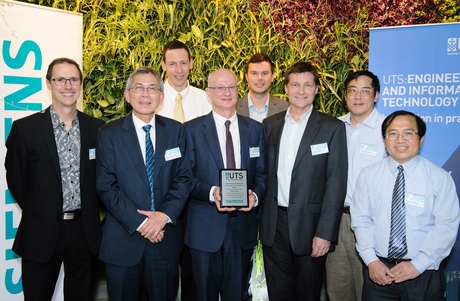UTS and Siemens strengthen ties for practice-based industry learning

In an effort to increase employment opportunities for students in the areas of science, technology, engineering and mathematics (STEM) education, Siemens Australia has committed to supporting practice-based industry learning opportunities at University of Technology Sydney (UTS) through the donation of equipment.
Siemens partnership with UTS has spanned more than 20 years; most recently, the company donated a distributed control system (DCS) for students. The DCS will be incorporated into the curriculum of five faculty subjects in the fields of electrical and mechatronic engineering, enabling students to practice for energy and manufacturing industries.
Students will learn both the practice and theory behind the system and get the opportunity to learn how to accurately monitor and adapt to the requirements of large-scale industrial control systems, such as the ones operating in Australia’s utilities and the oil and gas industry.
“Globalisation and digitalisation means that Australia has to compete globally. Siemens is focused on preparing students to participate in the fourth industrial revolution by getting them job- and competition-ready. We see this partnership with UTS, as well as others we have with universities across the country and organisations such as CSIRO and Simulation Australasia, as key to equipping the current and next generation with real-world experience that enables their entry into the workforce,” said David Pryke, executive general manager, Siemens.
According to electrical engineering graduate James Harkins, a past UTS student who completed two internships with Siemens and now works as a junior project engineer in the organisation, “The equipment bridges the divide between university and industry. It’s a system that is used to control manufacturing processes whereby one system can remotely control up to 30 stations, such as manufacturing plants or power stations. The technology is the same as that used in industry, so will prepare students and give them the confidence to practice in a real-world setting.”
Associate Professor Quang Ha, project leader at UTS, said, “This collaboration is invaluable. Not only will it allow us to integrate new technology into teaching and learning, offering great practical experience, but it also offers research opportunities.”
Control systems are adapting faster than ever, especially in the way they interpret data. Using smart data enables remote condition monitoring, providing cues about unexpected changes in conditions long before they become critical.
“We are witnessing an increasing need for and demand from students to get real exposure to the systems they will work on in future. It teaches them invaluable skills and gives UTS students a competitive edge over others by applying real-world knowledge. We are proud of our relationship with UTS and are invested in giving students the opportunity to learn and adapt through more realistic environments,” added Pryke.
According to the Australian Industry Group report Progressing STEM Skills in Australia, March 2015, STEM skilled jobs are growing 1.5% faster than other jobs.
Government finalises Net Zero Fund design
The Net Zero Fund will deliver targeted investments to support the transition to less...
BioCarbon secures funding to commercialise biochar coke
BioCarbon has secured ARENA support for its first commercial biochar steelmaking project...
Collie home to WA’s largest state-owned battery
Collie in Western Australia now has the state’s largest state-owned battery.











